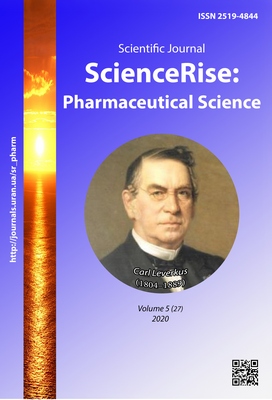Вивчення жирнокислотного складу соняшникової олії рафінованої та можливості його зміни протягом зберігання
DOI:
https://doi.org/10.15587/2519-4852.2020.215185Ключові слова:
соняшникова олія рафінована, жирнокислотний склад, якістьАнотація
Соняшникова олія рафінована є допоміжним компонентом багатьох лікарських форм аптечного виготовлення. Для їх виготовлення аптеки закуповують олію у різних виробників та мають право її використання протягом всього терміну придатності. Однак, виникає питання збереження стабільності жирнокислотного складу олії під впливом різних факторів оточуючого середовища. В попередніх дослідженнях авторами досліджено зміни складу основних жирних кислот (ЖК) соняшникової олії при нагріванні чи тривалому зберіганні, однак дослідження повного ЖК складу соняшникової олії відсутні, як і оцінка його залежності від періоду використання олії.
Мета. Детальне вивчення ЖК складу соняшникової олії рафінованої різних виробників, оцінка впливу терміну зберігання олії на її ЖК склад та його відповідності вимогам Європейської Фармакопеї (ЄФ).
Матеріали і методи. Визначення ЖК складу семи зразків соняшникової олії рафінованої проводили методом газової хроматографії з полуменево-іонізаційним детектором з використанням колонки Rt-2560 (100 м×0.25 мм×0.20 µм).
Результати. Проведений аналіз семи зразків соняшникової олії рафінованої показав наявність 24 жирних кислот (ЖК) в більшості з них. Переважають серед них поліненасичені ЖК з відсотковим вмістом 52.45-60.86 %. Значення відсоткового вмісту ЖК в кожній з груп (насичені, моно- та поліненасичені ЖК) досить близькі незалежно від терміну зберігання олії на момент проведення досліджень. Всі досліджувані зразки, крім одного, за відсотковим вмістом основних ЖК відповідають вимогам ЄФ. Результати визначення кількісного вмісту основних ЖК соняшникової олії (пальмітинової, стеаринової, олеїнової та лінолевої) також свідчить про близькість ЖК складу досліджуваних зразків.
Висновки. Досліджувані зразки соняшникової олії рафінованої за вмістом основних ЖК відповідають вимогам ЄФ. Отримані результати свідчать про високу стабільність олії та відсутність значного впливу на ЖК склад періоду їх зберіганняПосилання
- Guidoni, M., de Christo Scherer, M. M., Figueira, M. M., Schmitt, E. F. P., de Almeida, L. C., Scherer, R. et. al. (2019). Fatty acid composition of vegetable oil blend and in vitro effects of pharmacotherapeutical skin care applications. Brazilian Journal of Medical and Biological Research, 52 (2). doi: http://doi.org/10.1590/1414-431x20188209
- Derzhavna Farmakopeia Ukrainy. Vol. 3 (2014). Kharkiv: Derzhavne pidpryiemstvo «Ukrainskyi naukovyi farmakopeinyi tsentr yakosti likarskykh zasobiv», 732.
- Sunflower oil, refined: in European Pharmacopoeia (2020). Strasbourg: European Directorate for the Quality of Medicines, 3948.
- Gosudarstvennaia Farmakopeia SSSR (1961). Moscow: Gosudarstvennoe izdatelstvo meditsinskoi literatury MEDGIZ, 914.
- DSTU 4492:2017. Oliia soniashnykova. Tekhnichni umovy (2018). Kyiv: DP “UkrNDNTs”, 25.
- Kowalski, R. (2007). GC analysis of changes in the fatty acid composition of Sunflower and Olive oils heated with quercetin, caffeic acid, protocatechuic acid, and butylated hydroxyanisole. Acta Chromatographica, 18, 15–23.
- Porto, B. L. S., Mendes, T. O., Franco, D. F., Martini, W. S., Bell, M. J. V., Oliveira, M. A. L. (2016). Chemical monitoring of canola, corn, olive, soybean and sunflower oils after thermal treatment at conventional temperatures in domestic stoves. Revista do Instituto Adolfo Lutz, 75 (1694), 11.
- Kowalski, R., Kowalska, G., Pankiewicz, U., Sujka, M., Kałwa, K. (2017). GC analysis in evaluation of changes in fatty acids content of selected fats during storage and heating. Bulgarian Chemical Communications, 49 (4), 928–935.
- Cihelkova, K., Zarubova, M., Hradkova, I., Filip, V., Šmidrkal, J. (2009). Changes of Sunflower Oil polyenoic fatty acids under high temperatures. Czech Journal of Food Sciences, 27, S13–S16. doi: http://doi.org/10.17221/918-cjfs
- Derzhavna Farmakopeia Ukrainy. Vol. 1 (2015). Kharkiv: Derzhavne pidpryiemstvo «Ukrainskyi naukovyi farmakopeinyi tsentr yakosti likarskykh zasobiv», 1128.
##submission.downloads##
Опубліковано
Як цитувати
Номер
Розділ
Ліцензія
Авторське право (c) 2020 Lesia Savchenko, Liudas Ivanauskas, Tetyana Alekseeva, Nataliya Harna, Victoriya Georgiyants

Ця робота ліцензується відповідно до Creative Commons Attribution 4.0 International License.
Наше видання використовує положення про авторські права Creative Commons CC BY для журналів відкритого доступу.









